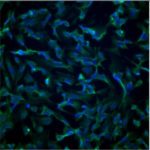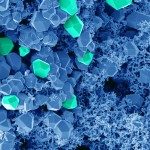Challenging DNA and histone methylation: Identification and characterisation of novel inhibitors to fight bacterial infections.
AntiMicrobialResistance (AMR) is major global health threat and it is urgent to identify new targets and new chemical compounds that fight infections and bypass resistance. A phenomenon common to most microbial infections is the dampening of the immediate immune response of the host, allowing long-term colonization. Thus, preventing this from occurring and/or reducing bacterial proliferation will give advantage to the host, thereby helping to eliminate the microbe. We and others have shown that A strategy to weaken host defences, common to several pathogens during infection, is to manipulate the epigenetic regulatory systems of the host. Indeed, pathogens either release factors that directly targets the host chromatin or hijack its epigenetic machinery, both resulting in alterations of the host epigenome. Importantly, epigenetic modifications, such as DNA and histone modifications, are reversible and modulate gene expression without changing the DNA sequence. This makes them ideal drug targets. In cancer treatment, epigenetic regulators (enzymes and chromatin-binding proteins) are already validated drug targets, with several molecules approved for clinical use. The laboratory EpiCBio at the Institut Pasteur aim at the identification of new compounds that target the histone and DNA methylation modifications induced in the host cells by the pathogens. In parallel to the synthetise of original chemical libraries, the lab develops new biological assays to screen and characterise the activity of the compounds.
We are looking for a talented and curiosity-driven post-doc or engineer interested at the interface of Chemistry and Biology to join us at EpiCBio, Institut Pasteur – CNRS UMR3523. The Epigenetic Chemical Biology Unit is composed of chemists and biologists working together in synergy.
The successful candidate will be in charge of the biological evaluation of an oriented chemical library targeting DNA and histone methylation designed and synthetized in house. She/he will manage three aspects of the project:
-the development of robust assays, in vitro and/or in cells, to screen the oriented chemical library.
-the biological validation of the hits by enzymatic, biophysical assays and phenotypical characterization.
-the optimization of the hit together with the chemists to propose a potential drug candidate or a chemical probe.
The candidate should have skills in enzymology, biochemistry, molecular and cellular biology, and microscopy. An open and cooperative interaction with the chemists of the team is essential to the project. In addition, the screening will be developed in collaboration with other teams of the Institut Pasteur, thus he/she should be very open to collaborations.
The post-doctoral position at the Institut Pasteur, Paris, is for 18 months. Starting dates are flexible, with a preference for beginning of January 2023.
Application, including a CV, two reference letters and detailed contacts, should be sent by email to paola.arimondo@cnrs.fr
Contact: Paola B. Arimondo
Laboratory: Epigenetic Chemical Biology
CNRS-Institut Pasteur UMR3523
Department of Structural Biology and Chemistry
Institut Pasteur
28 rue Dr Roux
75724 Paris cedex 15
FRANCE
phone +33 1 40 61 32 91
email: paola.arimondo@cnrs.fr
website: https://research.pasteur.fr/en/team/chimie-biologique-epigenetique/


